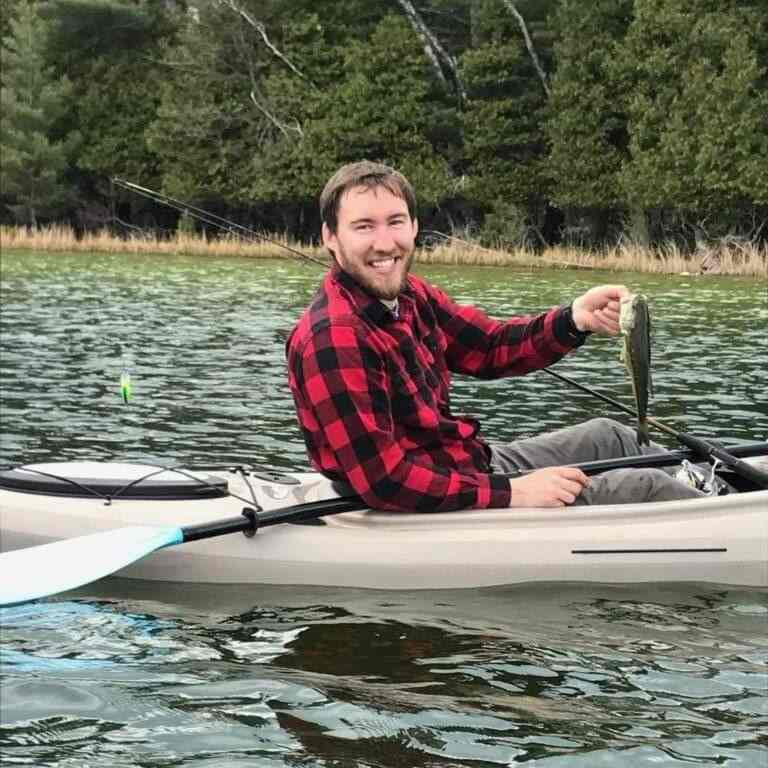News
In the Business of Charity
December 20, 2019

Learn More About the Integrative Studies Program
In the Business of Charity
Grand Valley State University Alumni Spotlight by Emma Schrider
Most of the time when we donate to Goodwill, the well-intentioned process of unloading our unneeded items at a drop off bay is the final step for us. For Earl Whitney, Manager of Salvage and Transportation for Traverse City's Goodwill branch, it is the first. When we drive away, hoping that the organization is able to do the right thing with items we’ve chosen to part with, Earl helps make it happen.
After graduating from Grand Valley State University in Traverse City in 2017, Earl joined the Goodwill organization as an entry level manager. He was promoted several times early on, achieving his current position in his first 6 months with the organization, and after hearing his take on the dynamic nature of charitable giving and recycling it’s easy to see why. Earl brings a helpful critical thinking skill set to the organization, and supports its humanitarian efforts by helping to streamline the logistics of what to do with all of the donated items flooding in every day.
Earl's journey to becoming an indispensable member of the northern Michigan Goodwill team began after he completed a term of service with the Army. Using his GI bill, Earl enrolled in Grand Valley State University's Integrative Studies program in Traverse City. Originally thinking that his path would lead him to become an Occupational Therapist, he took advantage of the integrative studies program’s flexibility and completed coursework in medical sciences. Though he enjoyed the nature of the profession and helping people with challenges find ways to troubleshoot the tasks of daily living, Earl concluded after an internship that the medical field was not for him.
Earl reflects that through his search for the right professional fit and his experiences in GVSU’s Integrative Studies program, he developed the agile critical thinking skill set that serves Goodwill so well today. In his time with Goodwill, Earl has observed that charity work draws warm-hearted, enthusiastic individuals whose skills are largely experience-based. This leaves charity organizations in a position to benefit from an academically prepared individual with a talent for organization and efficiency.
"Not everyone has to be a caseworker", Earl says, and makes the point that while the mindset of service is crucial, the mindset of a business person is also critically important. An operation based on donation has the potential to be not only underfunded, but overburdened by the sheer volume of material that is not in high demand locally. In order to keep the Goodwill store from being buried under a mountain of donations, Earl implements and improves creative paths for items to transition off the shelf and into the hands of those that need them.
"When you don't have capital, you have to have creativity."
Earl's team works to process goods that don't sell into salvaged scrap metal and textiles, packaging these materials into a transportable product. Used clothing, metal, and even cardboard are baled, loaded onto trucks, and moved all over the world. Unsold clothing is sent to Toronto and shipped far and wide, finding its way into grateful hands in Africa, Pakistan, and Eastern Europe. Technology is disassembled and recycled, supported by take-back legislation that holds producers financially responsible for the handling of a product at the end of its life.
Earl has been able to exercise his creative problem-solving and critical-thinking skills in many ways within the organization. He was able to tweak the process of baling material, adjusting the weight of the bales from 1200 pounds to 1000. The slightly counter intuitive change greatly improved the speed of the bailing process itself, and allowed for more effective balancing of truck loads.
"I'm not here to just continue what we're doing. I'm here to look at it with different eyes,” Earl says. Efficiency is rewarded in the transport industry, and Goodwill has been able to take advantage of financial incentives as a result of Earl's work. "That's just money that goes right back into programs."
In addition to providing Goodwill with every financial advantage he can, Earl was able to assist in keeping 4.2 million pounds of material from entering landfills last year by suggesting paths for recycling that are not cost prohibitive for the Goodwill organization. His passion and enthusiasm continue to benefit the Northern Michigan Goodwill organization and all those who are helped by its programs.
For more information about experiences at GVSU Traverse City and the Integrative Studies Program, contact Shannon Owen, Director of Northern Michigan Programs for Grand Valley State University at 231.995.1785 and at www.gvsu.edu/traverse.
Request Information About Traverse City Programs
